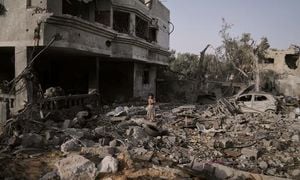Controversy surrounds Milan's "Salva Milano" plan as tensions escalate among politicians, environmentalists, and the community. The initiative, aimed at providing solutions to urban planning and housing crises, has sparked heated debates across political lines.
Recently, during comments made at the memorial for the victims of Foibe, Mayor Beppe Sala expressed the need for solid support for the "Salva Milano" project, stating, "It’s useless to think there can be unanimity about something like this, but I would like to see considerable backing from those who support me." This came as the city council prepared to vote on the plan, which has largely seen dissent among the Greens.
Vice Premier Matteo Salvini criticized the Democratic Party (PD) for delaying the initiative, asserting, "If it were up to me, the 'Salva Milano' would have been approved last summer. The PD and the left had some doubts; now it's almost been a year, and we're back to square one." The urgency of the situation is reflected by the thousands of families waiting for homes, many of whom are frustrated over what they perceive as legal obstacles impeding their housing rights.
Despite the backlash from environmental groups and division within the council itself, the council did approve the order of the day presented by the PD, urging the Senate to resolve the issues surrounding the law. The vote resulted in 22 votes for, 21 abstentions, and 7 votes against the proposal, illustrating the internal conflict within the leftist coalition.
Environmental activists have taken to the streets to protest the plan, gathering outside Palazzo Marino with slogans including, "Stop the malaise. The 'Salva Milano' will eat Milan. Do not vote for it. No to the bullies of construction." This backlash indicates widespread concern among citizens about the environmental ramifications of accelerated urban development.
Carlo Monguzzi, Green Party councilor, warned, "The day after approval, do not think everything will be as before. Environmentalists will not sit at the table to discuss the future without substantial dialogue." Monguzzi’s sentiments highlight fears of urban sprawl and loss of green spaces if the plan is enacted without adequate oversight and regulation.
Critics assert the legislation may inadvertently act as a way to grant amnesties for building violations, fundamentally changing the urban regulatory framework. This concern was echoed by public figures such as Giancarlo Tancredi, the Urban Regeneration assessor, who argued, "This law does not change anything, it’s part of democratic process, and values are set to evolve. It should provide clarity rather than chaos."
On the other side of the political spectrum, some members of the center-right see the project as too reactive and insufficient to grapple with underlying housing challenges. They argue the proposed measures focus on short-term fixes rather than addressing systemic issues affecting the city's planning and infrastructure historically.
After the council vote, there remains considerable debate on how the project will proceed, particularly with the impending Senate discussions. The absence of Mayor Sala from the council session added another point of contention, with opposition members describing it as “incredibly serious” for the city’s leadership.
Overall, the discussions surrounding the "Salva Milano" plan embody not only the immediate concerns about urban development and housing but also reflect broader anxieties about community governance, the role of political parties, and the future of city planning. With upcoming weeks expected to reveal the next steps for this legislation, the underlying discourse indicates the potential for more protests and political friction.
The complexity of the situation is underlined by the extensive involvement of various stakeholders and the depth of interest among citizens. Over 180 university professors, urban planners, and legal experts have urged lawmakers to reconsider the bill, claiming it could pave the way for damaging consequences for urban environments across Italy.
Supporters are advocating for what they view as necessary reforms aimed at revitalization and recovery for urban areas, yet the opposition remains steadfast against what they deem potentially damaging compromises. It is evident the debate around "Salva Milano" is not merely about housing; it encompasses larger values of democracy, ethics, and community integrity.
These varying perspectives underline the urgency surrounding Milan's urban development discussions, where the consequences of decisions made now could ripple through the cityscape for years to come. Whether the plans will cater to the needs of all residents remains uncertain as political factions grapple with their responsibilities and the voices of the community grow louder.
With continued pressures from both sides, as well as public outrage at the perceived trampling of democratic processes, the outcome of "Salva Milano" could redefine not only the urban fabric of the city but also the foundations of its political alliances and social contract. The future of Milan’s development hangs in the balance, awaiting the next chapter of this impassioned debate.



